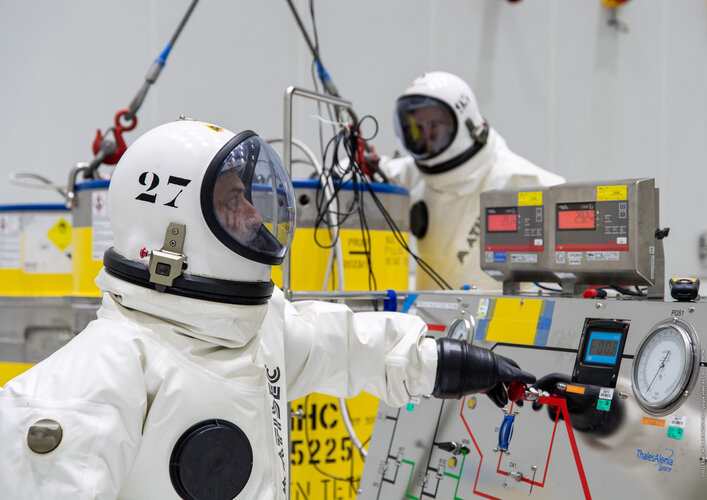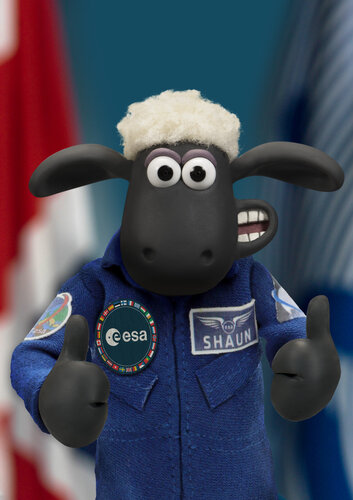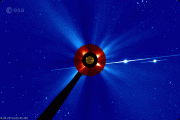
Copernical Team
New weather satellite fully loaded

With liftoff now scheduled for 13 December, Europe’s first Meteosat Third Generation Imager (MTG-I1) satellite has been fuelled – a critical and extremely hazardous milestone on the road to launch. Once in geostationary orbit 36,000 km above the equator, this all-new weather satellite will provide state-of-the art observations of Earth’s atmosphere and realtime monitoring of lightning events, taking weather forecasting to the next level.
Shaun the Sheep astronaut portrait
 Image:
Shaun the Sheep astronaut portrait
Image:
Shaun the Sheep astronaut portrait NASA awards contract for Mars Sample Return systems
 NASA has awarded a contract to Honeybee Robotics LLC of Longmont, Colorado, for the Mars Sample Return (MSR) - Capture, Containment, and Retrieval System (CCRS), Earth Entry System (EES), and Spin Eject Mechanism (SEM).
The total value of this cost-plus-fixed-fee contract is $17,686,341. The period of performance runs from Nov. 30, 2022, through July 30, 2026.
Honeybee Robotics LLC w
NASA has awarded a contract to Honeybee Robotics LLC of Longmont, Colorado, for the Mars Sample Return (MSR) - Capture, Containment, and Retrieval System (CCRS), Earth Entry System (EES), and Spin Eject Mechanism (SEM).
The total value of this cost-plus-fixed-fee contract is $17,686,341. The period of performance runs from Nov. 30, 2022, through July 30, 2026.
Honeybee Robotics LLC w Germany contributes four billion euros and remains key partner of European spaceflight
 On 22 and 23 November 2022, the ministers and government representatives of the 22 member states of the European Space Agency ESA met at the foot of the Eiffel Tower in Paris to set the course for joint space programmes "made in Europe". The Council at Ministerial Level is the highest political decision-making body, which sets the content and financial framework for ESA's space programmes on ave
On 22 and 23 November 2022, the ministers and government representatives of the 22 member states of the European Space Agency ESA met at the foot of the Eiffel Tower in Paris to set the course for joint space programmes "made in Europe". The Council at Ministerial Level is the highest political decision-making body, which sets the content and financial framework for ESA's space programmes on ave Phantom Space wins 4 new NASA Task Orders
 Phantom Space Corp. has been awarded four new NASA task orders to launch CubeSat satellites into space as part of the new VADR contract.
NASA's VADR missions (for Venture-class Acquisition of Dedicated and Rideshare) missions intend to meet the agency's needs for NASA payloads while also fostering the development of new launch vehicles from both emerging and established launch providers. V
Phantom Space Corp. has been awarded four new NASA task orders to launch CubeSat satellites into space as part of the new VADR contract.
NASA's VADR missions (for Venture-class Acquisition of Dedicated and Rideshare) missions intend to meet the agency's needs for NASA payloads while also fostering the development of new launch vehicles from both emerging and established launch providers. V China tests new Tianzhou fuel cell on route to Tiangong Station
 China has carried out an in-orbit test of its domestically developed space-based fuel cell, according to the China Academy of Space Technology. The academy, part of China Aerospace Science and Technology Corp, said the cell worked well in environments characterized by vacuums, extreme low temperature and microgravity during the test that took place recently outside the Tianzhou 5 cargo spaceship
China has carried out an in-orbit test of its domestically developed space-based fuel cell, according to the China Academy of Space Technology. The academy, part of China Aerospace Science and Technology Corp, said the cell worked well in environments characterized by vacuums, extreme low temperature and microgravity during the test that took place recently outside the Tianzhou 5 cargo spaceship China offers intl cooperation opportunity via Chang'e lunar missions
 The China National Space Administration (CNSA) on Thursday revealed the international payloads that will piggyback on the Chang'e 6 lunar exploration mission, and announced another call for international payload proposals for the Chang'e 7 mission.
The CNSA has announced that it will carry scientific instruments from France, Italy and the European Space Agency/Sweden on the Chang'e 6 missi
The China National Space Administration (CNSA) on Thursday revealed the international payloads that will piggyback on the Chang'e 6 lunar exploration mission, and announced another call for international payload proposals for the Chang'e 7 mission.
The CNSA has announced that it will carry scientific instruments from France, Italy and the European Space Agency/Sweden on the Chang'e 6 missi Japan space agency says research team tampered with ISS experiment
 Japan's space agency said Friday that a research team had tampered with data from an experiment simulating life on the International Space Station.
The team, headed by astronaut Satoshi Furukawa, will be "appropriately" punished because he had a supervisory role in the experiment, the Japan Aerospace Exploration Agency, or JAXA, said.
The experiments occurred in 2016 and 2017 and inv
Japan's space agency said Friday that a research team had tampered with data from an experiment simulating life on the International Space Station.
The team, headed by astronaut Satoshi Furukawa, will be "appropriately" punished because he had a supervisory role in the experiment, the Japan Aerospace Exploration Agency, or JAXA, said.
The experiments occurred in 2016 and 2017 and inv Orion surpasses Apollo 13 record distance from Earth: Flight Day 11
 On day 11 of the Artemis I mission, Orion continues its journey beyond the Moon after entering a distant retrograde orbit Friday, Nov. 25, at 3:52 p.m. CST. Orion will remain in this orbit for six days before exiting lunar orbit to put the spacecraft on a trajectory back to Earth and f a Sunday, Dec. 11, splashdown in the Pacific Ocean.
Orion surpassed the distance record for a mission wit
On day 11 of the Artemis I mission, Orion continues its journey beyond the Moon after entering a distant retrograde orbit Friday, Nov. 25, at 3:52 p.m. CST. Orion will remain in this orbit for six days before exiting lunar orbit to put the spacecraft on a trajectory back to Earth and f a Sunday, Dec. 11, splashdown in the Pacific Ocean.
Orion surpassed the distance record for a mission wit NASA Orion spacecraft enters lunar orbit: officials
 NASA's Orion spacecraft was placed in lunar orbit Friday, officials said, as the much-delayed Moon mission proceeded successfully.
A little over a week after the spacecraft blasted off from Florida bound for the Moon, flight controllers "successfully performed a burn to insert Orion into a distant retrograde orbit," the US space agency said on its web site.
The spacecraft is to take astr
NASA's Orion spacecraft was placed in lunar orbit Friday, officials said, as the much-delayed Moon mission proceeded successfully.
A little over a week after the spacecraft blasted off from Florida bound for the Moon, flight controllers "successfully performed a burn to insert Orion into a distant retrograde orbit," the US space agency said on its web site.
The spacecraft is to take astr 



































